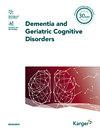Association between Baseline Cognitive Function and Longitudinal Functional Outcome Change after Ischemic Stroke
IF 2.2
4区 医学
Q3 CLINICAL NEUROLOGY
引用次数: 0
Abstract
Introduction: Ischemic stroke can cause impairment of daily function and cognitive function. Higher cognitive function is reported in many studies to be associated with better functional outcomes; however, evidence from longitudinal study is lacking. Therefore, in the present study, the association between cognitive function and longitudinal changes of functional outcome was investigated based on stroke severity. Furthermore, whether the effect of cognitive function remained consistent after controlling for depression was investigated. Methods: The data of 423 stroke patients (292 minor strokes, 93 moderate strokes, and 38 severe strokes) were collected. Baseline Mini-Mental State Examination (MMSE) score was considered a predictor, and change of modified Rankin Scale (mRS) score during 12 months of follow-up was the outcome. First, the association between the baseline MMSE score and longitudinal change in the mRS score was analyzed using linear mixed-effects models. Fixed effects were MMSE score group, time, and MMSE score group × time interaction. Additional adjustment was made for the Geriatric Depression Scale (GDS) score. Results: Among the 423 subjects, the mean age was 73.5 years, and 43.4% were female. In the minor stroke group, the high MMSE score group had a decreased mRS score, and the low MMSE score group had an increased mRS score (p < 0.001). This association remained after additional adjustment of the GDS score. Association was not observed between cognitive function and functional recovery in the moderate or severe stroke group. Conclusion: After ischemic stroke, higher baseline global cognitive function was a predictive factor for better functional recovery regardless of depression symptoms in the minor stroke group.缺血性脑卒中后基线认知功能与纵向功能改变的关系
缺血性中风可引起日常功能和认知功能的损害。在许多研究中,更高的认知功能与更好的功能预后相关;然而,缺乏来自纵向研究的证据。因此,在本研究中,基于脑卒中严重程度,研究了认知功能与功能结果纵向变化之间的关系。此外,还研究了控制抑郁后认知功能的影响是否保持一致。方法:收集423例脑卒中患者资料,其中轻度脑卒中292例,中度脑卒中93例,重度脑卒中38例。基线迷你精神状态检查(MMSE)评分被认为是一个预测因子,在12个月的随访中,修正兰金量表(mRS)评分的变化是结果。首先,使用线性混合效应模型分析基线MMSE评分与mRS评分纵向变化之间的关系。固定效应为MMSE评分组、时间、MMSE评分组×时间的交互作用。对老年抑郁量表(GDS)评分进行了额外的调整。结果:423例患者平均年龄73.5岁,女性占43.4%。在轻度脑卒中组,MMSE评分高组mRS评分降低,MMSE评分低组mRS评分升高(p < 0.001)。在对GDS评分进行进一步调整后,这种关联仍然存在。在中度或重度脑卒中组中,认知功能与功能恢复之间未观察到关联。结论:缺血性脑卒中后,较高的基线整体认知功能是轻度脑卒中组较好功能恢复的预测因素,与抑郁症状无关。
本文章由计算机程序翻译,如有差异,请以英文原文为准。
求助全文
约1分钟内获得全文
求助全文
来源期刊
CiteScore
4.70
自引率
0.00%
发文量
46
审稿时长
2 months
期刊介绍:
As a unique forum devoted exclusively to the study of cognitive dysfunction, ''Dementia and Geriatric Cognitive Disorders'' concentrates on Alzheimer’s and Parkinson’s disease, Huntington’s chorea and other neurodegenerative diseases. The journal draws from diverse related research disciplines such as psychogeriatrics, neuropsychology, clinical neurology, morphology, physiology, genetic molecular biology, pathology, biochemistry, immunology, pharmacology and pharmaceutics. Strong emphasis is placed on the publication of research findings from animal studies which are complemented by clinical and therapeutic experience to give an overall appreciation of the field.

 求助内容:
求助内容: 应助结果提醒方式:
应助结果提醒方式:


